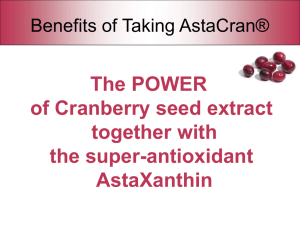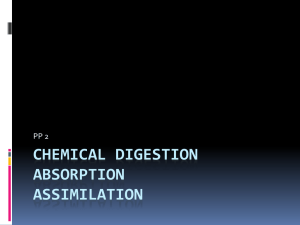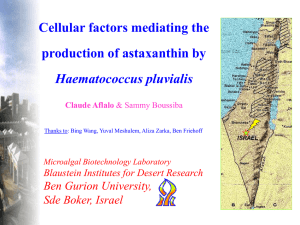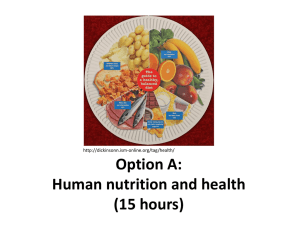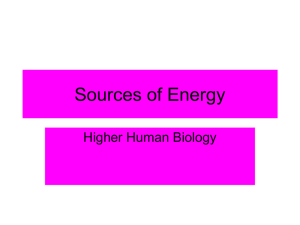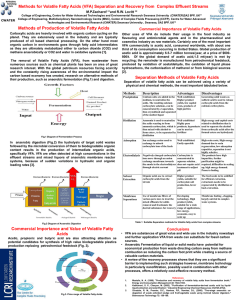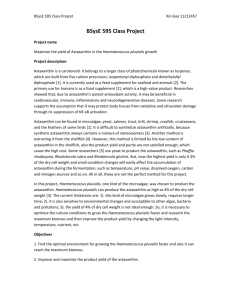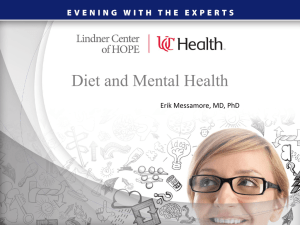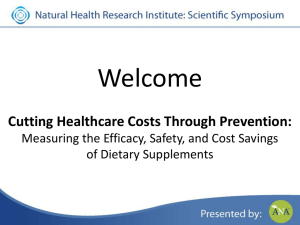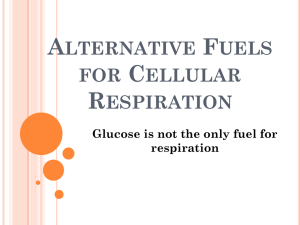Be and look healthy from the inside out
advertisement
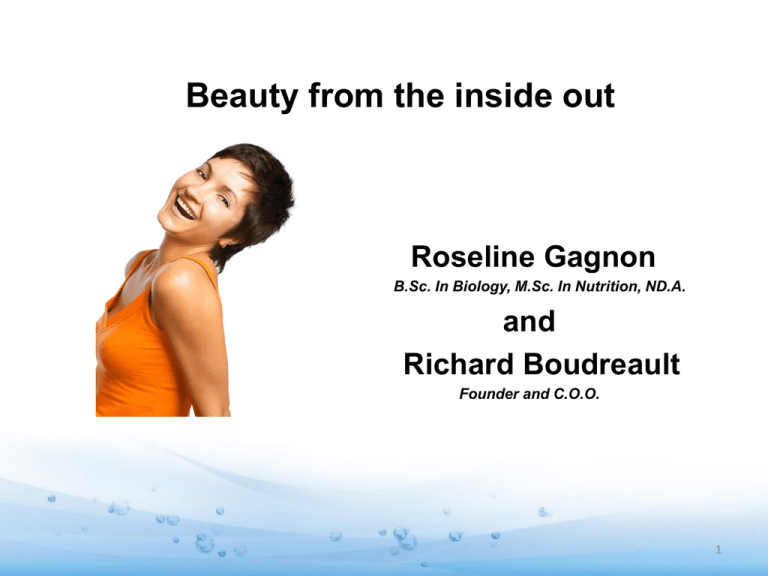
Beauty from the inside out Roseline Gagnon B.Sc. In Biology, M.Sc. In Nutrition, ND.A. and Richard Boudreault Founder and C.O.O. 1 Composition of the human body ► 60% water ● Foetus / 97% ● Infant / 75% ● Child ( 5 years old) / 70% ● Adult / 60% ● Elderly person / 55 % ► 20% lipids ► 15% proteins (including 30% collagen) ► 5% minerals and other components The wellbeing of the human body depends on the balance of these different components. 2 The Skin 3 The Cell 4 The main components of a cell Primitive atmosphere and primordial “soup” Simple Carbo hydrates Fatty acids Complex Lipid Carbo hydrates membrane Amino acids Proteins Fatty acids ► Omega-3 / Phospholipids Amino acids ► Peptides Complex carbohydrates ► Hyaluronic acid Proteins ► Collagen / Elastin Note: A human cell has a cellular nucleus and cellular organelles, which are not shown in our illustration here because it depicts a primitive cell. Nucleoli DNA, RNA Primitive cell 5 Aging of the skin • A natural phenomenon - How the skin looks as it ages - which is commonly referred to as mature skin - is determined first and foremost by genetics. - Signs of aging generally occur as a result of the denaturation (production slowdown) of the the skin’s building blocks – in particular, of collagen and elastin. - Skin becomes thinner, loses firmness and elasticity. 6 Aging of the skin • External causes: – – – – Chemical pollutants Sun’s rays Toxic overload Insufficient antioxidants and other nutritional elements – Dehydration – Smoking – Poor peripheral blood circulation 7 Aging of the skin • Clinical signs – – – – – – Dehydrated skin Lack of suppleness Dull complexion Acute skin sensitivity Presence of acne, rosacea, etc. Premature aging: appearance of wrinkles, fine lines and bags under the eyes – Over recent years, people have started showing these signs of aging earlier and earlier in life 8 Oxidative stress • Excess of free radicals in comparison to antioxidants • One of the main causes of cancer and many other degenerative diseases • Vital parts of cell (lipids, proteins and DNA) are attacked by free radicals. 9 Toxic overload Since the early 21st Century, people have been continuously exposed to a gamut of potentially toxic substances in the air, water and food, as well as to metabolic derivatives, etc. • Endotoxins: Produced by metabolic functions (eg: hormone degradation) • Exogenous: Chemical substances in the environment: pesticides, solvents, detergents, toxic metals, plastics (phthalates), insulation (asbestos), synthetic medications, food additives, cosmetics, etc. 10 Toxic overload Detoxification process: • The liver Emunctory elimination: • Intestine • Kidney • Lungs • Skin • Menstruation 11 Inflammation Silent inflammation is the first sign of the body’s imbalance and loss of homeostasis (the body’s ability to maintain stable, healthy function). • affects immune system • is linked to overproduction of proinflammatory eicosanoids • will manifest itself on skin, with the appearance of eczema, psoriasis, acne and rosacea. 12 Inflammation GLA-DGLA EPA-DHA Delta-5 Desaturase Vitamin C, Zn and required B3 Insulin activity Inhibited by glucagon and EPA PGE1 Arachidonic acid (AA) PGE3 PGE2 13 Factors for healthy skin Maintaining healthy skin - daily care: • Healthy, balanced alkalizing diet. Fruits and vegetable should be included in ALL meals and snacks. Choose those that are alkalizing to help reduce inflammation. - Sprouts - Basil - Blue berries - Broccoli - Carrots - Kale - Pumpkin - Cucumber - Red apples – Squash - Mango - Onion - Yellow apples - Parsley - Pear - Leeks - Colorful lettuce – Peppers – Avocado - Oils, complemented by Pure Multi Minerals Alkaline 14 Factors for healthy skin Maintaining healthy skin - daily care: • Include proteins in all meals to promote effective healing of inflamed tissues. Choose proteins that are easy to digest: - Oily fish - Poultry - Eggs - Goat and ewe dairy products - Nuts and grains - Legumes 15 Factors for healthy skin Maintaining healthy skin - daily care: • Avoid acidifying foods: - Citrus fruits - Alcohol - Asparagus - Wheat products - Cocoa - Coffee - Soft drinks – Cranberries - Hot spices - Strawberries - Milk – Olives - Hot peppers - Refined sugars - Black tea - Tomatoes - Red meats - Kiwi 16 Factors for healthy skin Maintaining healthy skin - daily care: • Optimal hydration: 25 ml daily per kg of body weight • Healthy weight • Restorative sleep • Regular physical activity • Good stress management 17 Factors for healthy skin Maintaining healthy skin - daily care: • Have a positive outlook on life • Avoid smoking and excessive alcohol consumption • Exfoliate skin • Protect skin • Avoid unhealthy environments 18 Role of dietary supplements Natural health products are complementary to healthy eating and lifestyle. They are not a panacea! 19 The importance of Omega-3 essential fatty acids. 20 Key types of fatty acids SATURATED (Bad fats) Saturated fatty acids are found primarily in animal fats (milk, cheese, butter, meat, lard, etc.), as well as in palm and coconut oil. UNSATURATED (Good fats) There are two types of unsaturated fatty acids: • monounsaturated (Omega-6 and Omega-9) • polyunsaturated (Omega-3) 21 Why take fish oil? Because oils from cold-water fish contain GOOD FATS (long-chain polyunsaturated Omega-3 fatty acids). Because Omega-3 is highly beneficial to the human body. Because the human body absolutely needs Omega-3 essential fatty acids. Because the human body does not produce Omega-3 essential fatty acids. Like vitamins, we can only get them by ingesting them. Because North Americans only take in 130 mg of EPA and DHA combined per day from their food. In other words, 520 mg less than the minimum daily requirement of 650 mg recommended by the Comité international des experts en matière d'acides gras essentiels (international committee of experts on essential fatty acids). 22 Omega-3 Omega-3s are GOOD FATS (polyunsaturated fatty acids). At Ocean+, our research focuses primarily on EPA and DHA. EPA / EICOSAPENTAENOIC ACID DHA / DOCOSAHEXAENOIC ACID EPA and DHA fatty acids come exclusively from marine sources. They are found most notably in: ● Oily fish (anchovies, mackerel, herring, sardines, salmon). They contain approximately 7 times more Omega-3 than Omega-6. Fish do not produce fatty acids in their bodies. They assimilate them through their food, largely from algae and plankton. ● Algae 23 Is flaxseed oil beneficial? Flaxseed oil contains the following fatty acid: ALA / ALPHA-LINOLENIC ACID • A precursor of the Omega-3 family, ALA can theoretically convert to EPA and then to DHA, but in very low amounts. • It is of plant origin. • ALA is found primarily in flaxseeds, leafy green vegetables (especially lamb’s lettuce or purslane), canola seed oil and nuts. • You need to take at least 15 teaspoons of flaxseed oil to get the same amount of EPA and DHA as in 1/4 teaspoon of Ocean+ Omega-3 fish oil. Think of all the calories that represents! • Only 0.2% of ALA is converted to EPA. • Only 0.05% of ALA is converted to DHA. 24 Should I take one fish oil supplement for mood and another for cardiovascular health? That is what some companies would have you believe. A lot of marketing promotes taking (i) one type of supplement specifically concentrated in EPA for your emotions and mood and (ii) one specifically concentrated in DHA for your good overall cell health, cardiovascular health and brain development. But is it just that – a lot of marketing. Why spend more? If you are taking 2 or 3 different types of fish oil supplements with varying concentrations of EPA and DHA to address different health concerns, then you are overspending. Get it all with Ocean + Omega-3, our superior-quality fish oil supplement that has optimal concentrations of EPA, DHA and DPA, providing you with the complete benefits of Omega-3 essential fatty acids all in one product. Plus, it is the only one on the market that is effectively protected from harmful oxidation. 25 Omega-3 / Omega-6 According to the Agence Française de Sécurité Sanitaire des Aliments (French food safety agency), we should take a minimum ratio of: One (1) Omega-3 for five (5) Omega-6 The Inuit ingest 3 Omega-3 for 1 Omega-6 The Japanese ingest 1 Omega-3 for 3 Omega-6 We cannot overdose on Omega-3. We can get the amount of Omega-6 that our bodies need through diet. Furthermore, it is possible to get too much Omega-6, which can lead to a proinflammatory situation. We believe that you do not need to take a supplement specifically sold as a source of Omega-3-6-9 because there are sufficient amounts of Omega-6 and Omega-9 in the vegetable oils that we use on a daily basis. 26 The benefits of Omega-3 on cells The Cell Plasma membrane of cells The plasma membrane holds the cell together and is found in every cell of all living beings. It contains several biological molecules, notably lipids (phospholipids in most cases) and proteins involved in a vast range of cellular functions. It constitutes a barrier with very selective permeability. It is involved in the exchange and plays a protective role between the intracelluar and extracellular environment. 27 The benefits of Omega-3 on cells What happens when saturated fatty acids are replaced by polyunsaturated fatty acids in the lipids of the membrane? Membrane permeability is improved. What is the impact? (See next page.) Passage and speed of passage of the following are improved: • • • • • Electric currents (neurons - cells of the nervous system) Water Oxygen and carbon dioxide Mineral nutrients (amino acids, sugars, etc.) Minerals and salts What happens if the lipids in cell membranes tend to be more of the saturated fatty acid type (bad fats) than of the polyunsaturated fatty acid type (good fats)? Membrane permeability decreases, resulting in less exchange and therefore cell degeneration. 28 Benefits of Omega-3 on cells Few PUFA: low fluidity Abundant PUFA: high fluidity © E. Kraffe 29 Health benefits of Omega-3 Countless studies on Omega-3s have shown: •They play a role in maintaining overall good health. •They help maintain good cell health (of the skin). •They play an important role in supporting cell membrane elasticity and permeability. •They promote cognitive health and brain function (helping to stabilize moods and ward off depression). •They contribute to (normal) brain, eye and nerve development in children up to the age of 18. •They help maintain and support cardiovascular health. •They help reduce blood clotting and viscosity. •They play a role in reducing blood pressure through blood vessel dilation. •They play a role in reducing serum triglyceride/tryglycerol levels in the blood. •They have anti-inflammatory properties. •They play a role in reducing pain (inflammation) caused by rheumatoid arthritis (if used in conjunction with conventional treatment). •They have anti-tumor properties. 30 Competitive advantage of our Omega 3 An unique property to integrate fish oils in creams and other cosmetics Analyses made by the laboratoires Maska Inc., April to June 2011 31 Competitive advantage of our Omega 3 Analyses made by the laboratoires Maska Inc., 2005 Role of food supplements Antioxidants • The human body produces antioxidant enzymes. • To prevent oxidative stress, an antioxidant supplement is recommended. • Vitamins, minerals, amino acids, alpha-lipoic acid, coenzyme Q10, carotenoids (astaxanthin – NOXvp), bioflavonoids and other phytonutrients. 33 Antioxidant complex NOXvp 34 Antioxidant complex NOXvp Oxidation is one of the least discussed issues associated with consuming lipids - especially essential fatty acids. Oxidized fatty acids turn into molecules (free radicals) that are harmful to the body and can be at the root of a number of health concerns (Aging – Hypertension – Atherrosclerosis – Cancer) . NOXvp is a plant-based antioxidant complex that protects lipids - Omega-3 essential fatty acids in particular - from oxidation. NOXvp is a combination of phospholipids, astaxanthin and vitamin E - all of which are naturally sourced and GMO-free. The antioxidant complex NOXvp is also patent pending. Advantages of the antioxidant complex NOXvp on human health: • Powerful antioxidant. • Prolongs freshness and significantly stabilizes lipids (essential fatty acids) for at least 24 months. • Reduces free radicals, the cause of so many health issues. • Stimulates the immune system. • Phospholipids protect cell membranes from damage caused by toxins and free radicals. Key component of the cell membrane. • Astaxanthin is a powerful antioxidant, with antioxidant activity that is greater than vitamin E, betacarotene and lycopene. 35 Antioxidant complex NOXvp Even a high number of carotenoids cannot protect lipids (fatty acids) as effectively as NOXvp. Recommended daily allowances of Omega-3 essential fatty acids is1.3 g, or 1 portion of salmon (70g). Taking 1-2 Ocean+ Pure Omega-3 capsules is a simple, healthy way to meet your daily essential fatty acid requirements. A simple, healthy way to meet your essential fatty acid requirements, Ocean+ Pure Omega-3 is highly concentrated in Omega-3 essential fatty acids and is protected from oxidation by the antioxidant complex NOXvp. 36 Astaxanthin 37 Astaxanthin Astaxanthin is a carotenoid (other members of the carotenoid family inlcude lutein, xanthophyll, beta-carotene and lycopene). Like many carotenoids, it is an intensely colored pigment (deep red) that is soluble in fats and oils. Unlike other carotenoids, astaxanthin is not converted to vitamin A by the human body. (Too much vitamin A is toxic for the human body). All studies indicate that taking astaxanthin is safe, non toxic and has no side effects on the human body. Astaxanthin is a natural nutritional element. Astaxanthin is used (in Japan, Europe and the United States) as a dietary supplement for people, as well as pets. The main source of astaxanthin is the micro algae haematococcus pluvialis. 38 Astaxanthin Chemical structure and antioxidant properties Given its chemical structure, astaxanthin is able to function between the double membranes of the cell (inner and outer ) and protect them from free radical attacks on lipids and proteins by quickly neutralizing the free radicals. Scientific studies show that astaxanthin is powerful at neutralizing free radicals. Astaxanthin is 6000 times more powerful than Vitamin C, 550 times more powerful than Vitamin E and 40 times more powerful than betacarotene when it comes to neutralizing free radicals. Astaxanthin is a pure antioxidant. (Astaxanthin does not display pro-oxidizing characteristics, regardless of conditions, which is not the case with certain antioxidants) Astaxanthin has effective, powerful antioxidant properties that are beneficial to health. 39 Health benefits of astaxanthin Free radicals and endurance exercise Did you know that an endurance exercise that uses 70% of an athlete’s VO2 max (maximum oxygen uptake) can generate 12 times the level of free radicals in cells than when the athlete is at rest or sleeping? Lactic acid Lactic acid can be caused by a number of factors, including sustained and prolonged muscle exertion. Lactic acid is produced by the organism following poor tissue oxidation. Accumulating a relatively high level of lactic acid in the body can lead to an acidosis state (excessive acid in the blood). 40 Health benefits of astaxanthin Several scientific studies have demonstrated the role of astaxanthin in physical endurance, especially with regards to activities and sports that are very physically demanding. 41 Health benefits of astaxanthin Several scientific studies have demonstrated the role of astaxanthin in muscle recovery, especially with regards to activities and sports that are very physically demanding. 42 Health benefits of astaxanthin Several scientific studies have also shown: the role of astaxanthin in decreasing eye fatigue (asthenopia) by reducing inflammation, increasing blood flow and improving focus. the role of astaxanthin in reducing the impact of environmental factors and skin aging. 43 Minerals 44 Minerals The human body needs minerals The body cannot produce minerals - they must be ingested. All tissues and cells contain minerals needed for different metabolic processes. Alkaline mineral salts play an important role in acid neutralization. A high number of minerals can be found in the bones. For example: 2% of body weight is calcium, 99% of which is in the bones. The pH value of a fluid is a gauge of acid-base ratio Blood in the human body has a somewhat alkaline pH level. Strict pH regulation is vital to optimal function. Buffering agents in the blood maintain a constant pH level. These agents prevent sudden changes to pH when acids are released into the blood. By neutralizing acid, they maintain a balanced pH level. Residual products of metabolic acid are eliminated through blood flow. For example, carbonic acid is released as carbon dioxide by the lungs. Other acids are eliminated through the kidneys and excreted in urine. Acid-base balance describes the relationship between these two components In optimal cases, acid and alkaline mineral salt are in balance - in the same way that balance is maintained between food intake and excretion of metabolic waste. 45 Minerals Why is pH important? The body regulates acid levels very rigorously; it uses buffers such as alkaline mineral salts (eg: calcium carbonate). When pH is acid (less than 7.35 in the blood), the body will use any means possible to balance pH. How does the body become acid? Acids are usually produced by the body’s metabolism. Hyperacidity (higher than normal acid levels) can nevertheless occur as a result of factors such as too much meat, not enough fruits and vegetables, stress, inflammation, aliphatic medicine and toxins. In today’s modern society, most people experience these factors on a daily basis. What happens when the body becomes acid? When acid levels rise, the body uses its buffers to neutralize acids. If the acid levels continue to climb, the body will use any buffering agent available to keep pH levels in the blood stable and balanced. Even the slightest fluctuations in blood pH can be harmful. The body will store acids in conjunctive tissues, which can cause inflammation and degeneration in the body. To access buffering agents, the body will borrow calcium and other alkalizing minerals from the bones. This can result in osteoporosis. Several other issues, from digestive problems to allergies, can be linked to acidosis. 46 Minerals Balancing alkaline levels Create a food regimen where alkalinizing foods represent roughly 75% of your diet and complete with Pure Multi Minerals alkaline supplements. In essence, minerals can be used to help • Counter acidity. • Reduce inflammation through alkalization. • Prevent osteopenia and osteoporosis. 47 Care for your skin holistically - and you will achieve overall optimal health at the same time. 48
